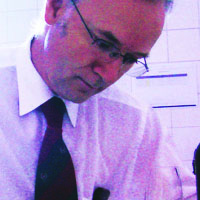António Américo da Rocha Graça

PORVID – Portuguese Association for the Grapevine Diversity
([email protected])
Master Degree (MSc) in Oenology by University of Trás-os-Montes and Alto Douro. Participate in the creation of wines of Ferreira, Offley, Sandeman e Casa Ferreirinha brands. He is the responsible of Investigation and Development Department in Sogrape Vinhos, SA.. His areas of interest are preservation of Portuguese autochthonous vine varieties that are in risk of extinction, adaptation of viticulture to climate change and creation of effort networks distributed in intra- and inter-enterprise. Viticulture expert in Portuguese Committee for International Organisation of Vine and Wine (OIV) and in Viticulture Committee of OIV in Paris.
Communication Abstract
Title: Douro’s grape varieties – terroir’s resilience
Abstract: Iberian Peninsula is the second centre of European grape diversity (Vitis vinifera) and a secondary centre of its historical human domestication. In Portugal, more than 150 places have been identified with wild populations of this species, whose DNA analysis showed that they are close lineages of the vines used in this country for the production of wines. Unlike many other countries, Portugal has not replaced its native grape varieties by international ones, keeping a unique originality potential, based on its ancestral biodiversity. This fact has created a sensorial profile in Portuguese wines different from the rest of the world’s wines, which attracts more and more consumers. Douro Demarcated Region, more than other country region, is the best example of the latter. Pioneer in the creation of the first denomination of origin in the world, it is also notable due to the largest number of vine varieties authorized for the production of its liqueur wines (Porto) and dry wines (Douro). This incredible diversity has been actively conserved and valued by a remarkable collaborative action at the national level resulting in the largest vine diversity conservation project in the world. More than 30,000 clones were identifies in this project using an innovative method of selection aimed to avoid diversity loss. This project supports the resilience and profitability of hillside vineyards that will continue to make the Douro a region unique in the world.


 Português
Português